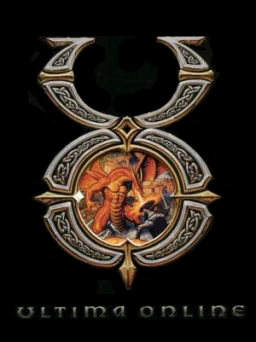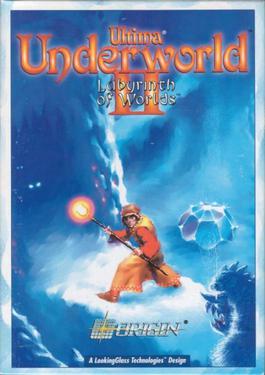Stygian Abyss may refer to:
- Ultima Underworld: The Stygian Abyss , 1992 video game developed by Blue Sky Productions
- Ultima Online: Stygian Abyss , 2009 expansion for the Ultima Online video game developed by Electronic Arts
Stygian Abyss may refer to:

Ultima is a series of open world fantasy role-playing video games from Origin Systems, created by Richard Garriott. Electronic Arts has owned the brand since 1992. The series had sold over 2 million copies by 1997.

Ultima Online (UO) is a fantasy massively multiplayer online role-playing game (MMORPG) released on September 24, 1997 by Origin Systems.

Looking Glass Studios, Inc. was an American video game developer based in Cambridge, Massachusetts. The company was founded by Paul Neurath with Ned Lerner as Blue Sky Productions in 1990, and merged with Lerner's Lerner Research in 1992 to become LookingGlass Technologies. Between 1997 and 1999, the company was part of AverStar, where it was renamed Looking Glass Studios. Following financial issues at Looking Glass, the studio shut down in May 2000. Notable productions by Looking Glass include the Ultima Underworld, System Shock and Thief series.

Origin Systems, Inc. was an American video game developer based in Austin, Texas. It was founded on March 3, 1983, by Richard Garriott and his brother Robert. Origin is best known for their groundbreaking work in multiple genres of video games, such as the Ultima and Wing Commander series. The company was purchased by Electronic Arts in 1992.

Martin Galway is one of the best known composers of chiptune video game music for the Commodore 64 and the ZX Spectrum. His works include Rambo: First Blood Part II, Comic Bakery and Wizball's scores, as well as the music used in the loader for the C64 version of Arkanoid.
Free look describes the ability to move a mouse, joystick, analogue stick, or D-pad to rotate the player character's view in video games. It is almost always used for 3D game engines, and has been included on role-playing video games, real-time strategy games, third-person shooters, first-person shooters, racing games, and flight simulators. Free look is nearly universal in modern games, but it was one of the significant technical breakthroughs of mid-1990s first-person perspective games. Many modern console games dedicate one of the several analogue sticks on the gamepad entirely to rotating the view, where as some older console games, when gamepads usually had fewer or only a single D-pad or analogue stick, had a feature where the single D-pad or analogue stick would move the view instead of the character whilst the player held down another button at the same time, often labelled in game as the "look button".

Ultima IV: Quest of the Avatar, first released in 1985 for the Apple II, is the fourth in the series of Ultima role-playing video games. It is the first in the "Age of Enlightenment" trilogy, shifting the series from the hack and slash, dungeon crawl gameplay of its "Age of Darkness" predecessors towards an ethically-nuanced, story-driven approach. Ultima IV has a much larger game world than its predecessors, with an overworld map sixteen times the size of Ultima III and puzzle-filled dungeon rooms to explore. Ultima IV further advances the franchise with dialog improvements, new means of travel and exploration, and world interactivity.

Ultima Underworld: The Stygian Abyss is a first-person role-playing video game developed by Blue Sky Productions and published by Origin Systems. Released in March 1992, the game is set in the fantasy world of the Ultima series. It takes place inside the Great Stygian Abyss: a large cave system that contains the remnants of a failed utopian civilization. The player assumes the role of the Avatar—the Ultima series's protagonist—and attempts to find and rescue a baron's kidnapped daughter.
Arkane Studios SASU is a French video game developer based in Lyon. It was founded in 1999, and released its first game, Arx Fatalis, in 2002. Besides the Lyon studio, Arkane Lyon, Arkane Studios operates Arkane Studios LLC in Austin, Texas, since July 2006. The studio is most known for creating the Dishonored series.

Ultima Underworld II: Labyrinth of Worlds is a 1993 first-person role-playing video game developed by LookingGlass Technologies and published by Origin Systems. As the sequel to Ultima Underworld: The Stygian Abyss, the game is set in the Ultima fantasy universe. Players assume the role of the Avatar—the protagonist of the Ultima series—and adventure through multiple dimensions while seeking to prevent the evil Guardian from achieving world domination. Progression is largely nonlinear and the game allows for emergent gameplay.

John Madden Football '93 is a 1992 sports video game developed by Blue Sky Productions and Electronic Arts and published by EA Sports. Based on the sport of American football, the player controls a football team in modes such as tournament play and sudden death. Officially endorsed by John Madden, it was the third Madden game for home consoles and the first one that saw a simultaneous release on both, the Sega Genesis and Super NES.
Mike McShaffry, a.k.a. "Mr. Mike," is a video game programmer, entrepreneur and author. He is known as the director of Ultima VIII: Pagan. He graduated from the University of Houston and began his video game industry career working for Origin Systems in 1990. He worked on titles such as Martian Dreams, Ultima VII: The Black Gate, Ultima VIII: Pagan, Ultima IX: Ascension and Ultima Online. In 1997 he formed his own company Tornado Alley. After that, he worked at Glass Eye Games for a while on Casino games, which were notable for being the first games he worked on that his mom enjoyed playing.
Stygian refers to the goddess and underworld river Styx in Greek mythology.
Denis Loubet is an artist who has worked on several pen-and-paper role-playing games and video games, including the MMORPG Ashen Empires.

Underworld Ascendant is a first-person action role-playing game developed by Otherside Entertainment and published by 505 Games. It is the sequel to Ultima Underworld: The Stygian Abyss and Ultima Underworld II: Labyrinth of Worlds. Players assume the role of the Avatar, as they return to the Stygian Abyss. As in the original games, there is an emphasis on non-linear progression, simulated systems, and emergent gameplay. It was released on Microsoft Windows on November 15, 2018.
An immersive sim (simulation) is a video game genre that emphasizes player choice. Its core, defining trait is the use of simulated systems that respond to a variety of player actions which, combined with a comparatively broad array of player abilities, allow the game to support varied and creative solutions to problems, as well as emergent gameplay beyond what has been explicitly designed by the developer. This definition is not to be confused with game systems which allow player choice in a confined sense or systems which allow players to easily escape consequences of their choices.
Legions of the Undead is an unreleased action role-playing video game that was in development by Rebellion Developments and originally planned to be published by Atari Corporation on a scheduled Q3, 1995 release date for the Atari Jaguar. It was also intended to be released for the Windows and PlayStation.
Nine full expansion packs for the MMORPG Ultima Online have been released. The first, Ultima Online: The Second Age, arrived in 1998. The most recent expansion pack is Ultima Online: Time of Legends (2015).